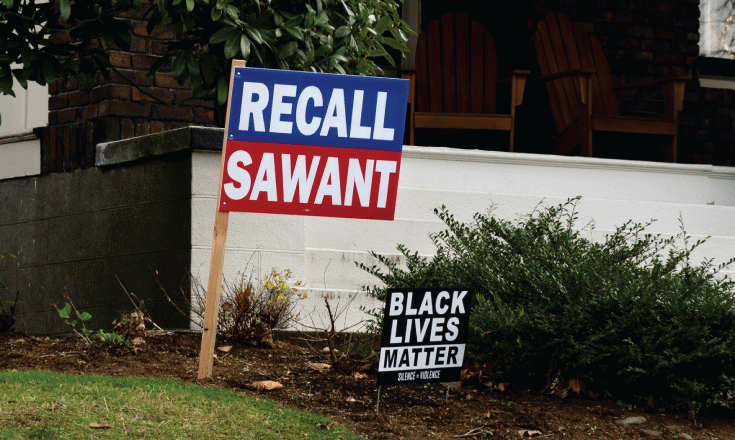Kshama Sawant, Seattle City Councilmember and self-identified Socialist, will head to the Washington State Supreme Court this coming January to continue her appeal of a recall effort made against her.
Capitol Hill resident and LGBTQ+ activist, Ernie Lou, submitted the petition for recall of Sawant on August 18, 2020. Lou said that Sawant was “the leftist version of the right-wing version of Trump,” and “a cancer in Seattle.” Lou claimed to have lost his “dream job” as an independent contractor at Three Dollar Cinema because of his petition, a claim refuted by the cinema.
The petition lobbied six grievances against Sawant, two of which have been dismissed. The remaining allegations include:
- Opening City Hall to protesters during the pandemic
- Leading a BLM march to Mayor Jenny Durkan’s home, breaching a state confidentiality agreement
- Using city resources, including $2000, to promote her ballot initiative, Tax Amazon
- Delegating the hiring and firing of her councilmember staff to her political group, Socialist Alternative
The recall process started with Lou’s petition, then was reviewed by King County Superior Court Judge Jim Rogers, who ruled to allow four of the six allegations to proceed. Sawant subsequently appealed the decision to the Washington State Supreme Court. If the Court permits the petition to continue, then 10,739 signatures are needed from registered voters to place Sawant’s recall on the special elections ballot on April 27th, 2021.
The Recall Sawant campaign has received 3766 financial contributions from both residents within Sawant’s District 3, as well as those who reside outside the district. However, only District 3 residents are allowed to sign the petition and vote on the recall.
In contrast, the Kshama Solidarity campaign lauds the accomplishments of Sawant, including:
- Championing and winning the Amazon Tax that will raise 500 million a year by levying Seattle’s top 500 companies
- Leading the $15 an hour minimum wage initiative and winning
- Sponsoring the ban on wintertime evictions, which was approved by Seattle City Council
- Sponsoring legislation to prevent the use of crowd control weapons on protestors, which was approved by City Council
Additionally, Sawant said in her 2013 campaign that she would donate roughly half of her salary to campaigns benefiting social justice movements, bringing her take-home pay to $40,000 a year, which she said was the average take home pay at the time.
However, the Seattle City Council Insight said, “[In 2017] Sawant gave $13,800 to Socialist Alternative, and Socialist Alternative in turn spent over $11,000 flying Sawant and Priest [Sawant’s husband] around the world.” The SCC Insight speculated that these flights were beneficial to Sawant’s brand as much as the organization’s interests.
Sawant has continued to donate half of her salary, but a large chunk of those contributions are for Socialist Alternative, as well as 15 Now, an organization with ties to Sawant’s husband. In 2019, Sawant estimated her net worth to be roughly $490,000. The average salary has changed dramatically since Sawant first ran for office, and is now estimated to be between $80,000 and $102,000 a year.
Sawant’s Tax Amazon legislation that passed in November was not the first attempt of its kind. Rather, Tax Amazon gained headway in 2018 until Jeff Bezos, CEO of Amazon and richest man alive, threatened to curb Amazon’s growth within the city and top Amazon employees donated large sums of money to local political PACs.
With Sawant at the helm, Tax Amazon re-rallied to pass in November with a tax four times greater than the initial proposal. The tax will generate roughly $500 million in funds, a quarter of which will go to the Seattle Green New Deal, while the remainder will be used to build affordable, sustainable homes for low to middle-income and retired fixed-income persons.
Despite it’s passing in November, the proposal was met with criticism, including fear that taxing Amazon would push the company out of the city. Indeed, Bloomberg reported in August that Amazon recently polled its Seattle workers on how they felt about relocating. It’s important to note that, as of September, Bezo’s wealth grew by a whopping $128 billion in 2020. With this year’s profits alone, Bezos could pay for the $500 million Amazon Tax in a day.
It’s no secret that Seattle houses some of the richest corporations and people in the world. As of 2017, the top 20% of income earners in Seattle earn more than half of the city’s total income. Gentrification is spreading, low and middle-income families are being pushed out, and homelessness is rampant.
In response, Sawant has grown her popularity from the ground up, fueled by regular, grungy, working-class Seattle citizens who are emboldened by her “fuck the man” agenda. In light of this, it makes sense that someone like Sawant would bite-her-thumb at local government and open City Hall’s doors to her constituents, and that they would love her for it.
It also makes sense that Sawant’s actions would ruffle the feathers of people who value the law as the cornerstone of modern society and would see Sawant’s actions as rabble-rousing and dangerous. It makes sense that the Seattle elite would look at Sawant and her growing influence and see a direct threat to their pocketbooks, or resent her for the dents she has already made. And it makes sense that Sawant is a hypocrite and not quite the “working man” she claims to be.
Despite all of this, it is undeniable that Sawant has made hugely positive contributions to the working-class citizens of Seattle. The question is: is that enough? How do her infractions weigh in light of the greater good of Seattle? Should her actions be considered a breach of law, contract, and the public’s trust? Or was she merely playing her best hand in the ruthless game of thrones?
Author

Harlow Poffenberger is a Visual Media student at Seattle Central College where she works as an editor at The Seattle Collegian and curates the weekly ART SPACE column. Harlow also likes thru-hiking, traveling, and other adventurous pursuits, and once lived in a house with a bear.











Be First to Comment